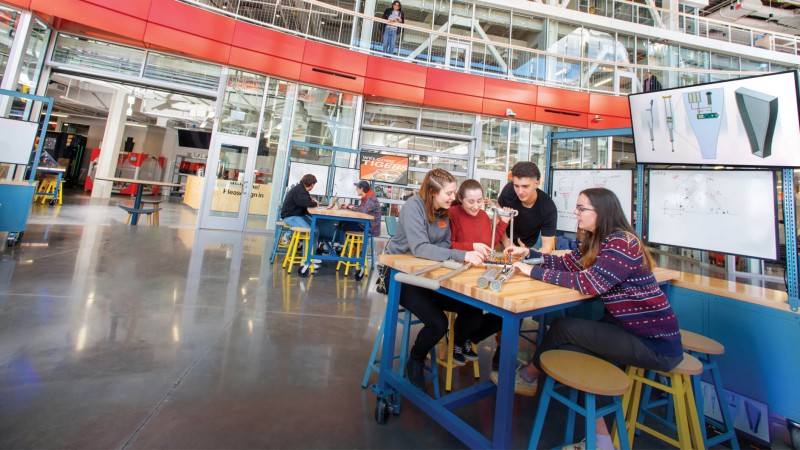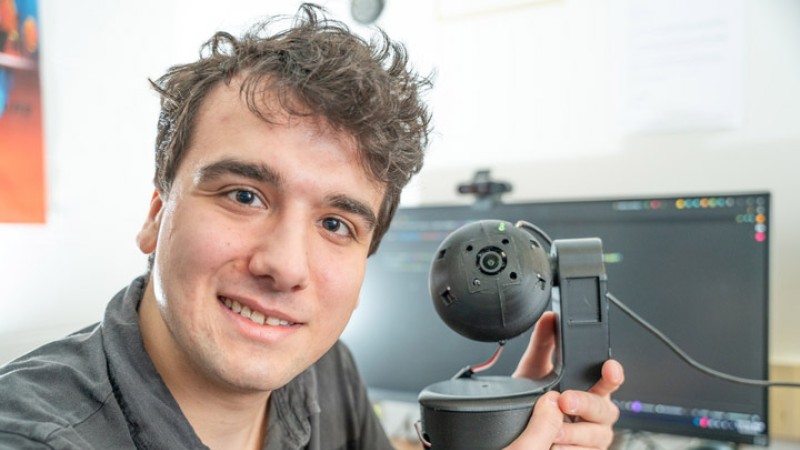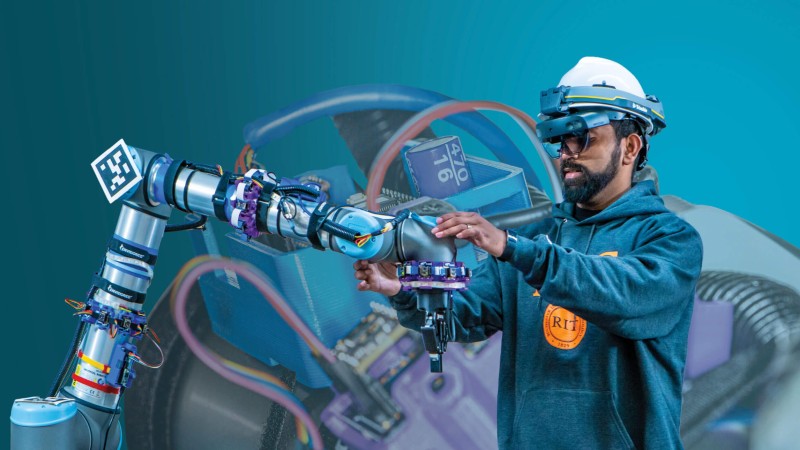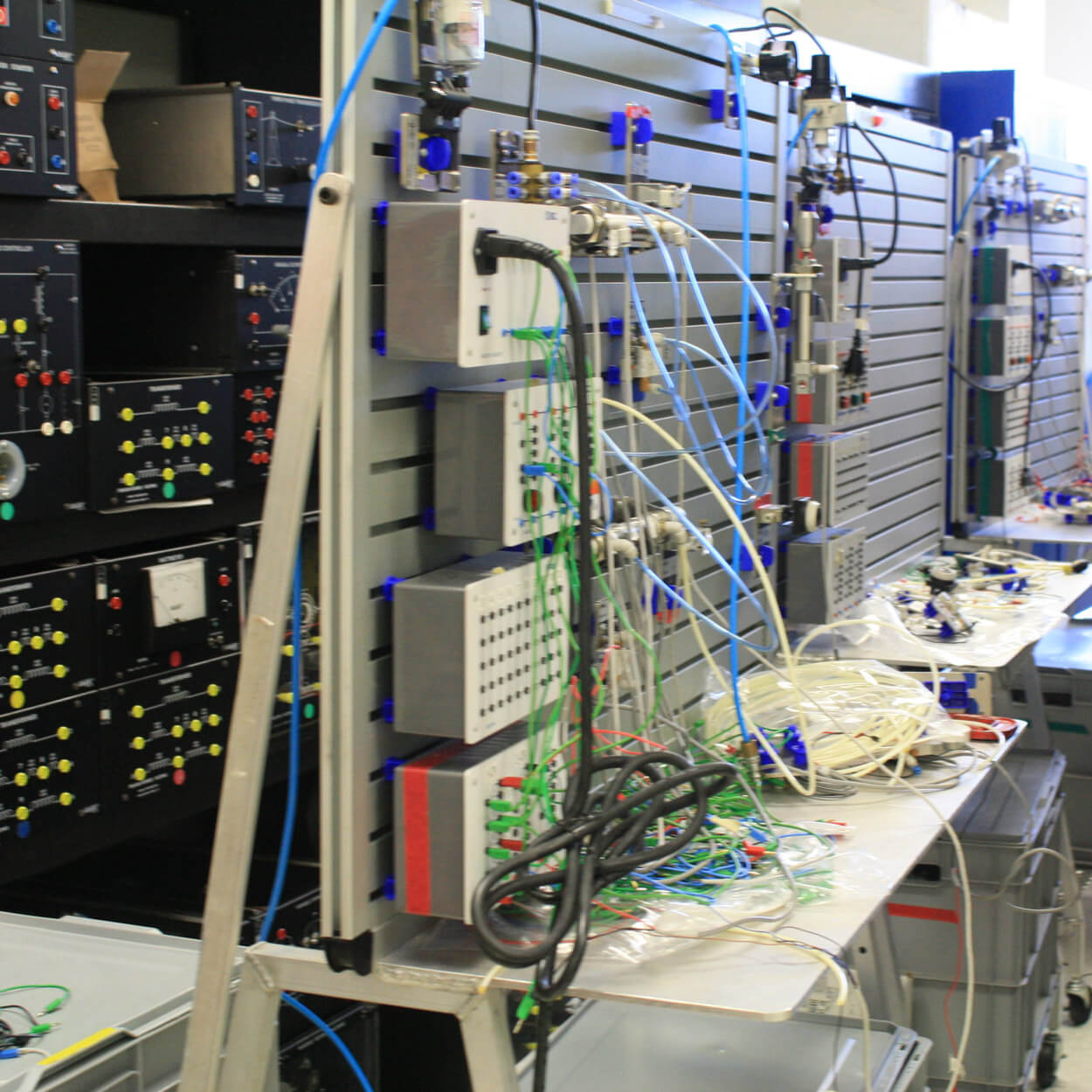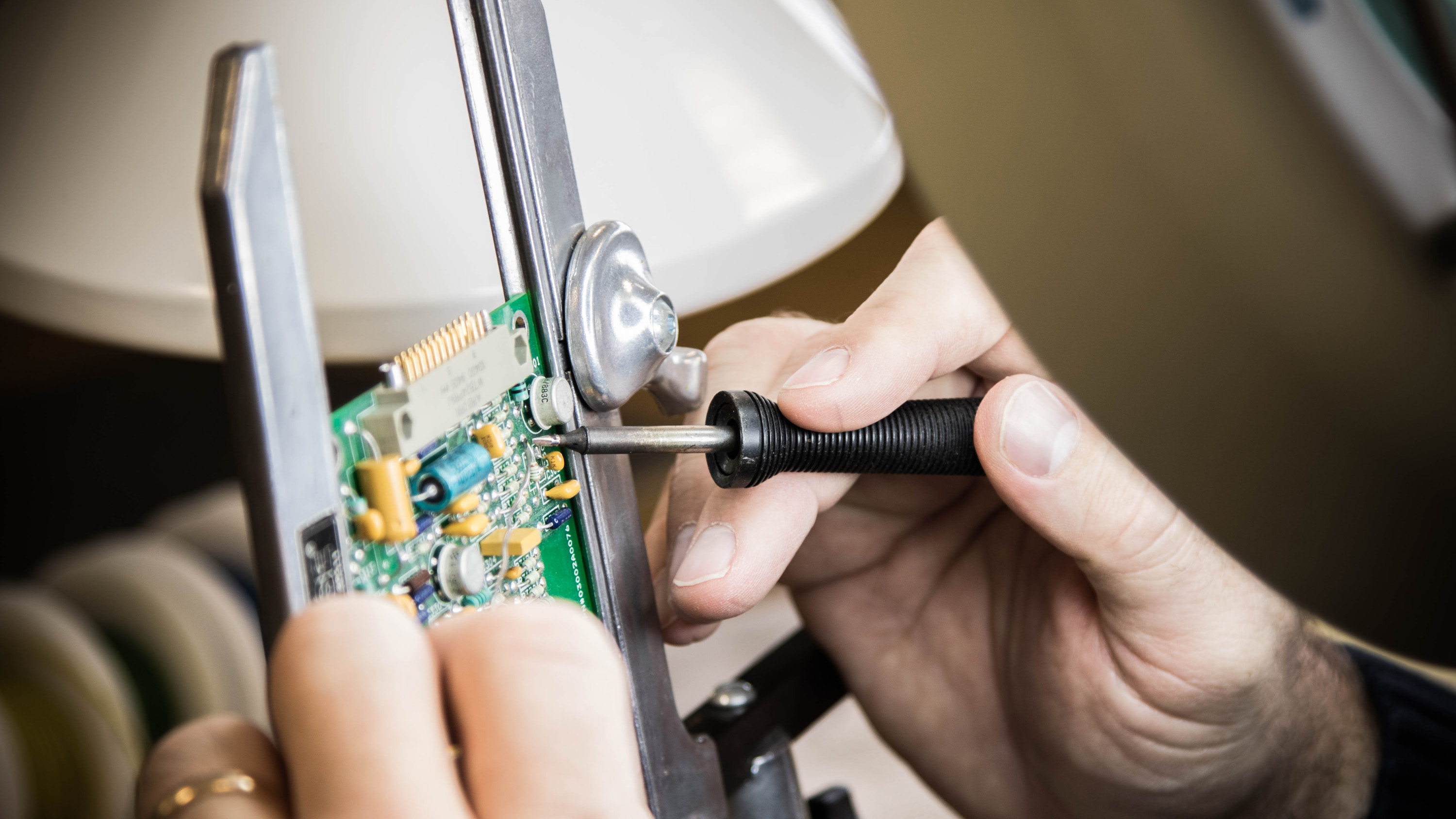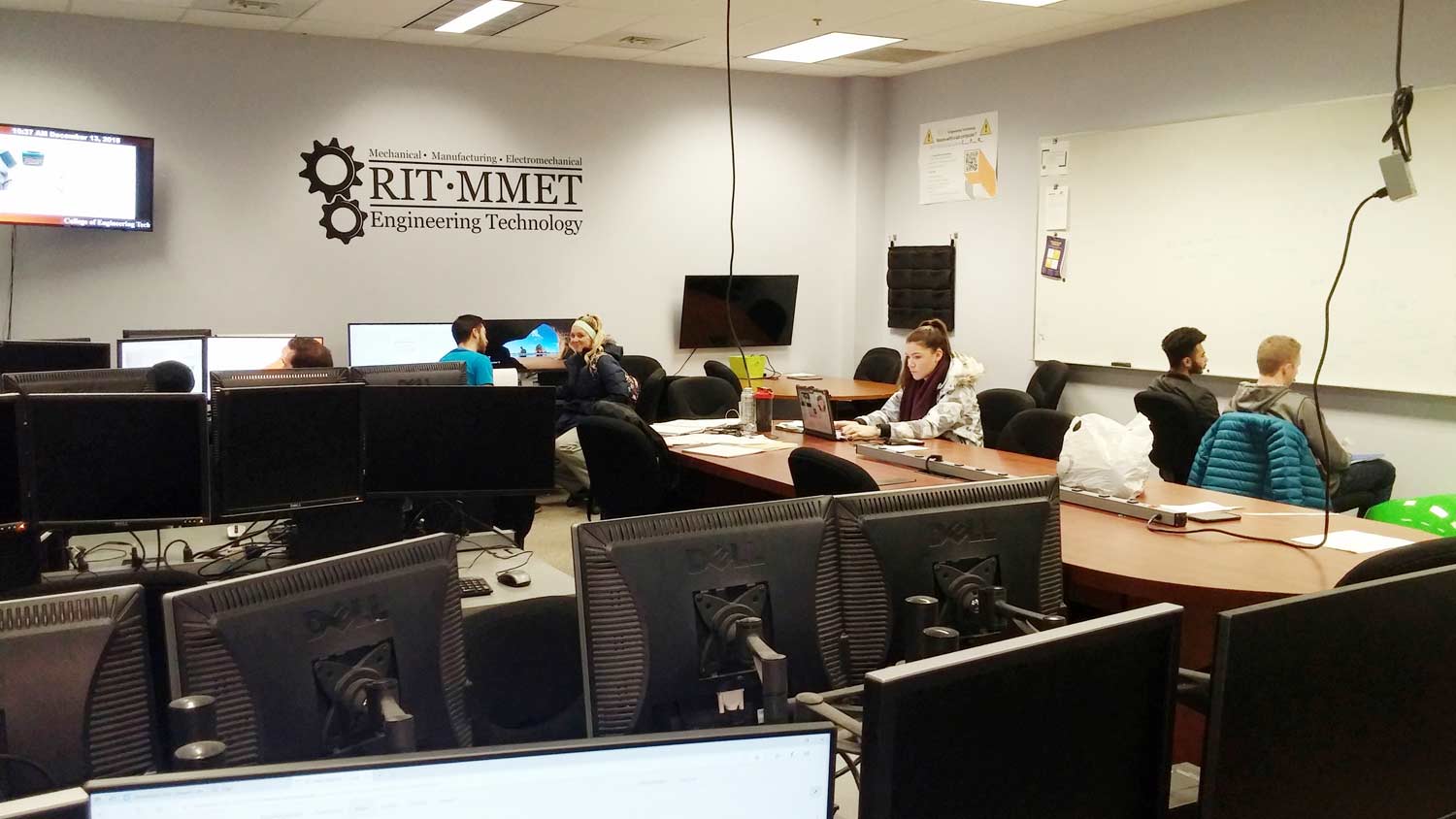Mechatronics Engineering Technology Bachelor of Science Degree
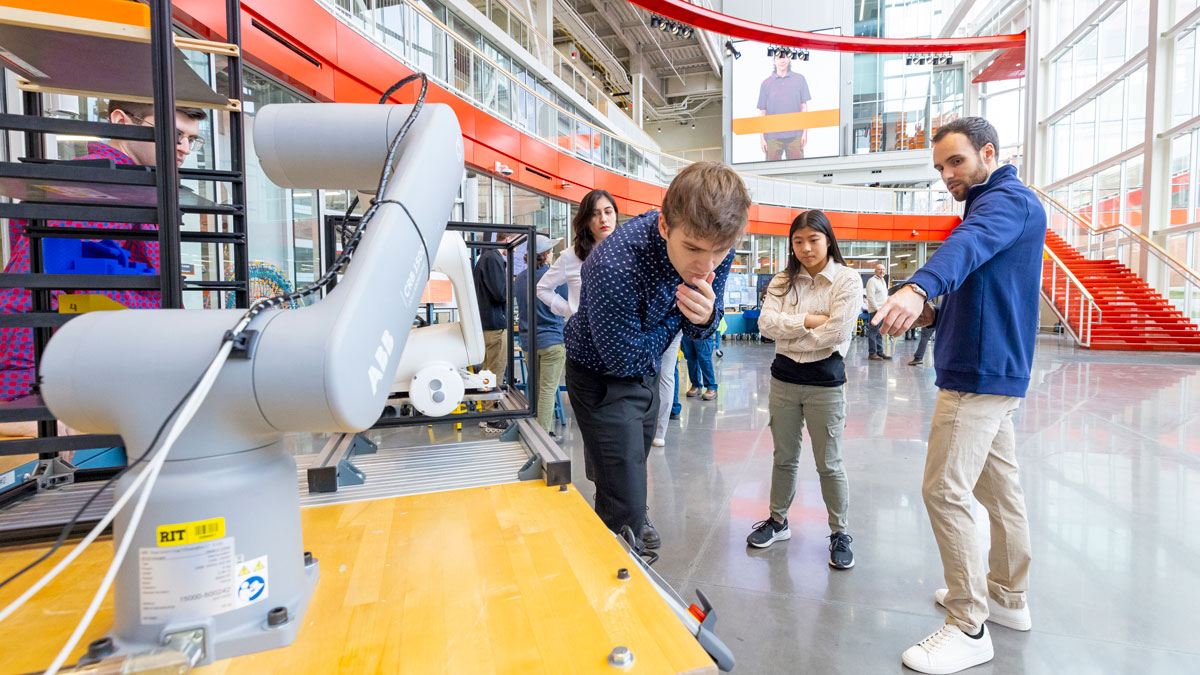
Mechatronics Engineering Technology
Bachelor of Science Degree
- RIT /
- Rochester Institute of Technology /
- Academics /
- Mechatronics Engineering Technology BS
RIT's BS in Mechatronics Engineering Technology prepares students to drive the design and development of smart products by integrating electrical and mechanical systems.
$70K
Median First-Year Salary of RIT Graduates from this degree
72%
required courses in the College of Engineering Technology for this major have a lab component
Overview for Mechatronics Engineering Technology BS
Why Study Mechatronics Engineering Technology at RIT?
Gain Real-World Experience: Four required blocks of cooperative education mean nearly a year of hands-on, full-time paid work experience in industry.
Accelerated Bachelor/Master's Option: Earn two degrees in less time by pursuing your BS in mechatronics engineering technology and in manufacturing and mechanical systems integration.
Jobs at Industry Leading Companies: Recent graduates with a degree in mechatronics engineering technology are employed at Tesla, Lockheed Martin, Boeing, General Motors, Northrop Grumman, SharkNinja, SONY Electronics, Bausch & Lomb, Boston Scientific and more.
STEM-OPT Visa Eligible: The STEM Optional Practical Training (OPT) program allows full-time, on-campus international students on an F-1 student visa to stay and work in the U.S. for up to three years after graduation.
The dynamic capabilities of mechatronic engineering are everywhere.
- Airplanes are complex mechanical systems with thousands of embedded computers and electrical systems that coordinate and monitor everything from the flight control system, navigational system, and air speeds to interior lights, wing flaps, and communication systems.
- Sorting and packaging systems on production lines combine manufacturing efficiencies with computer systems that can effectively scan, sort, and package products.
- Smart doorbells integrate motion sensing, real-time video capture, facial recognition, and voice control, all controlled by an app on your phone.
- Drones combine electrical, computer, and mechanical engineering with control systems and imaging technologies in order to take off and land, capture photos and videos, gather and communicate data, and accurately aim and launch projectiles.
These are just a sampling of the ways people interact with devices driven by mechatronics. And students who earn a mechatronics engineering degree are at the forefront of developing and integrating the technologies that influence how we work, play, learn, and live.
What is Mechatronics Engineering Technology?
Mechatronics engineering technology combines electrical, computer, and mechanical engineering, along with systems integration and project management. It focuses on mechanics, electronics, robotics, automation, imaging and sensing technologies, and computing to design and develop smart products and smart manufacturing systems. Mechatronics engineering is the design and development of the entire system in mind, not just one component.
There is a growing need for mechatronic engineers who have a strong foundation in the key areas – electrical engineering, computer engineering, mechanical engineering, programming, systems design, manufacturing processes, robotics, and automation – that influence the design and development of products with the whole system in mind, not just one component.
A bachelor's degree in mechatronics engineering technology integrates these key areas into one program that prepares students for careers in designing and developing the products of the future. RIT’s mechatronics engineering technology degree takes a systems approach, analyzing the whole system and breaking it down into subsystems and their individual components to prepare graduates for the innovative design solutions that will be required of them.
RIT’s Degree in Mechatronics Engineering Technology
In the BS degree in mechatronics engineering technology, students develop skills in mechatronics engineering courses that build a foundation of knowledge in electrical, computer, and mechanical engineering. You’ll also study:
- Circuits and electronics
- Computing and programming
- Manufacturing materials
- Microprocessors and digital systems
- Automation and robotics
- Control systems
Adding a minor in a complementary area of study deepens your expertise in a core area of mechatronics and broadens your skill set for a career in this dynamic field. These minors support the mechatronics engineering technology degree:
- Applied statistics
- Business administration
- Computer science
- Cybersecurity
- Engineering management
- Manufacturing systems
- Plastics engineering and technology
- Surface mount electronics manufacturing
- Sustainable product development
Four blocks, or approximately one year, of cooperative education provides full-time, paid experience in industry. A senior design project in your final year is a team-based experience where you will combine your coursework and co-op experiences to work on a design project focused on the development of mechatronic technologies, such as components and systems.
High-Performance Teams and Professional Organizations
Many mechanical engineering students participate in high-octane performance teams, including the RIT Formula SAE Racing Team, the SAE Aerodesign Club, the RIT Baja SAE Team, RIT SAE Clean Snowmobile Team, and the Human-Powered Vehicle Competition team. They are also encouraged to participate in the student chapters of professional societies such as the American Society of Mechanical Engineers, the Society of Women Engineers, the National Society of Black Engineers, the Society of Hispanic Professional Engineers, the American Institute of Aeronautics and Astronautics, and the Society of Automotive Engineers.
Furthering Your Career in Mechatronics Engineering Technology
Combined Accelerated Bachelor’s/Master’s Degrees
Today’s careers require advanced degrees grounded in real-world experience. RIT’s Combined Accelerated Bachelor’s/Master’s Degrees enable you to earn both a bachelor’s and a master’s degree in as little as five years of study, all while gaining the valuable hands-on experience that comes from co-ops, internships, research, study abroad, and more.
- Mechatronics Engineering Technology BS/Mechatronics and Mechanical Systems MS: Design the future in this accelerated dual degree pathway that combines the mechatronics engineering technology BS with the MS in mechatronics and mechanical systems. You'll be at the forefront of developing and integrating the technologies that influence how we work, play, learn, and live. And you'll be prepared to meet the ever-growing industry demand for skilled engineers in mechanics, electronics, robotics, and automation with a career-ready business, management, and leadership skillset that comes from the master's degree in mechatronics ad mechanical systems.
- +1 MBA: Students who enroll in a qualifying undergraduate degree have the opportunity to add an MBA to their bachelor’s degree after their first year of study, depending on their program. Learn how the +1 MBA can accelerate your learning and position you for success.
-
Join Us for Accepted Student Open House
Visit campus on March 28 or April 11 to meet faculty, tour campus, and ask your questions.
-
Join us for Fall 2026
There's still time to apply. For some programs, applications will be reviewed on a rolling, space-available basis.
Careers and Cooperative Education
Typical Job Titles
| Advanced Manufacturing Engineer | Application Engineer | Automation Engineer |
| Controls Engineer | Electrical Engineer | Mechanical Engineer |
| Operations Test Engineer | Process Engineer | Product Engineer |
| Research and Development Engineer |
Industries
-
Aerospace
-
Automotive
-
Biotech and Life Sciences
-
Consumer Packaged Goods
-
Defense
-
Manufacturing
-
Transportation and Logistics
Cooperative Education
What’s different about an RIT education? It’s the career experience you gain by completing cooperative education and internships with top companies in every single industry. You’ll earn more than a degree. You’ll gain real-world career experience that sets you apart. It’s exposure–early and often–to a variety of professional work environments, career paths, and industries.
Co-ops and internships take your knowledge and turn it into know-how. Your engineering co-ops will provide hands-on experience that enables you to apply your engineering knowledge in professional settings while you make valuable connections between classwork and real-world applications.
Students in the mechatronics engineering technology degree are required to complete four co-op blocks. You'll alternate periods of full-time study with full-time paid work experience in your career field. In some circumstances, other forms of experiential education (e.g., study abroad, research, military service) may be used to fulfill part of the co-op requirement. Each student is assigned a co-op advisor to assist in identifying and applying to co-op opportunities.
Featured Work and Profiles
-
Students Revolutionize AI in Education
Kyle Scher Discover how Kyle and three classmates built ProGenie, an AI tool designed to enhance student engagement and learning at RIT's College of Engineering Technology, set to roll out in the spring.
Read More about Students Revolutionize AI in Education -
What's Being Made in the SHED
Making at RIT has hit a new level now that several makerspaces in the Student Hall for Exploration and Development (SHED) have opened. Learn what's being created.
Read More about What's Being Made in the SHED -
Self-taught AI Dynamo Finds his Niche at RIT
Brayden Levangie First-year RIT student Brayden Levangie juggles a role as an AI developer and researcher in robotics while working on a groundbreaking AI project and creating a self-evolving robot.
Read More about Self-taught AI Dynamo Finds his Niche at RIT -
Robotic Solutions: Student Project
An RIT College of Engineering Technology student employs force feedback and vision systems on an ABB robot to simulate and optimize the grinding of dental tools.
Read More about Robotic Solutions: Student Project -
RIT Researchers Push Boundaries of Human-Robotic Interactions
Ferat Sahin, Jamison Heard, Yangming Lee Several RIT faculty researchers are pushing the boundaries of human-robotic interactions.
Read More about RIT Researchers Push Boundaries of Human-Robotic Interactions
Curriculum for 2025-2026 for Mechatronics Engineering Technology BS
Current Students: See Curriculum Requirements
Admissions and Financial Aid
This program is STEM designated when studying on campus and full time.
First-Year Admission
First-year applicants are expected to demonstrate a strong academic background that includes:
- 4 years of English
- 3 years of social studies and/or history
- 3 years of math is required and must include algebra, geometry, and algebra 2/trigonometry. Pre-calculus is preferred.
- 2-3 years of science. Chemistry or physics is required and biology is recommended.
- Technology electives are preferred.
Transfer Admission
Transfer applicants should meet these minimum degree-specific requirements:
- A minimum of college algebra is required. Pre-calculus or calculus is preferred.
- Chemistry or physics is required.
Financial Aid and Scholarships
100% of all incoming first-year and transfer students receive aid.
RIT’s personalized and comprehensive financial aid program includes scholarships, grants, loans, and campus employment programs. When all these are put to work, your actual cost may be much lower than the published estimated cost of attendance.
Learn more about financial aid and scholarships
Accreditation
Resources
Access Resources for students including academic advisors, student clubs and organizations, documents, technical information and support, and software help.
Related News
-
November 19, 2025

Club sports help students find their fit
Club sports are a big part of student life at the university. Every year, about 2,000 students are involved with the nearly 50 different club sports. For many, it scratches that competitive itch. For others, it’s a chance to try something new, find a community, and stay active.
-
July 21, 2025

Studio 930 students create assistive solutions for real-world challenges
The interdisciplinary and collaborative Studio 930 program asks students to apply what they know, learn what they don’t, and design products that make life, or a single task, more efficient and accessible.
-
August 21, 2024

"Deaf Ninja" Kyle Schulze competed in American Ninja Warrior finals Monday. How did he do?
Rochester's Democrat and Chronicle features Kyle Schulze's '24 (mechatronics engineering technology) appearance on American Ninja Warrior.
Contact
- Cecilia Creel Gomez
- Senior Staff Assistant
- Department of Mechanical and Mechatronics Engineering Technology
- College of Engineering Technology
- 585‑475‑2270
- cccmet@rit.edu
Department of Mechanical and Mechatronics Engineering Technology













